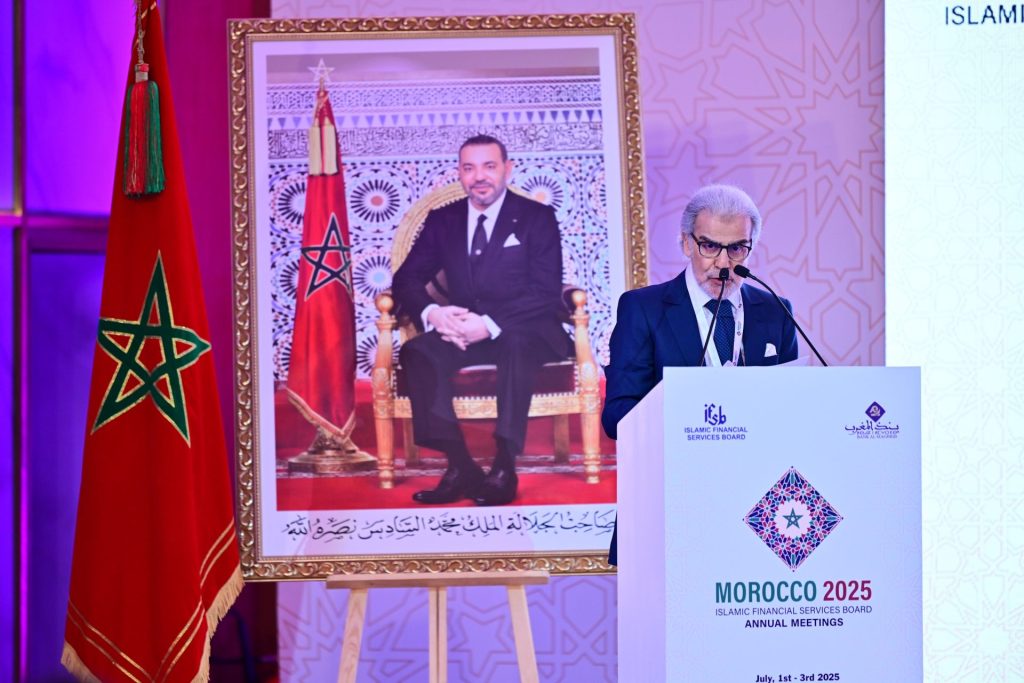
Rabat, MOROCCO – 3 July 2025 – The Islamic Financial Services Board (IFSB) convened its 23rd Islamic Financial Stability Forum in Rabat, Morocco under the theme ‘Navigating Shallow Waters: Addressing Structural Vulnerabilities and Shoring Resilience to Future Shocks”. Held alongside the IFSB’s 2025 Annual Meetings, the Forum brought together central bank governors, senior regulators, international standard-setters and industry stakeholders to exchange policy perspectives on promoting sound growth and long-term financial stability of the Islamic financial services industry.
The Forum opened with remarks by His Excellency (H.E.) Abdellatif Jouahri, Governor of Bank Al-Maghrib, Chair of the IFSB Council 2025, and Dr. Ghiath Shabsigh, Secretary-General of the IFSB, and a keynote address by the Honourable Dr. Ahmed Toufiq, Morocco’s Minister of Endowments and Islamic Affairs. The Forum was attended by high-level dignitaries and representatives from over 30 countries.
In his welcome remarks, H.E. Abdellatif Jouahri highlighted the efforts made by IFSB to support Bank Al-Maghrib at every stage of the development of Participation banking regulatory framework. Morocco’s participation finance sector continues to grow and to contribute to the enhancement of financial inclusion
In his speech on this occasion, the Honourable Dr. Ahmed Toufiq, Morocco’s Minister of Endowments and Islamic Affairs explained that “In the Moroccan context, the issue of Islamic finance was raised, and Morocco adopted it on the basis that other types of transactions are also religiously acceptable, considering their objectives (maqasid) and contractual nature. However, these operations, which are derived from the historical jurisprudence of financial transactions, were welcomed on the condition that they be referred to locally as participatory finance so as not to monopolise the term Islamic, which might logically imply that other forms of finance are not Islamic or are contrary to Islam. In this regard, the Sharī’ah Committee for the Participatory Finance issued 194 conformity opinions in response to requests for religious guidance, during more than 421 scholarly meetings. In these sessions, 196 studies and research papers were presented by the committee members, in addition to 191 specialised studies provided by the committee’s experts, covering legal aspects, practical applications, and comparisons between systems, experiences, and practices.”
Ahead of the panel discussions, the Forum featured a presentation of key findings from the IFSB’s recently released Islamic Financial Services Industry Stability Report 2025. The report highlights the increasing scale and reach of the Islamic financial services industry but underscores the need to address structural issues that may affect the industry’s long-term financial stability.
Dr. Shabsigh noted, “While the Islamic financial services industry has seen renewed growth momentum long-standing structural gaps—especially in the non-bank sectors—must be addressed to ensure this growth is resilient and sustainable. Deepening sukūk markets, enhancing financial infrastructure, and advancing the regulatory reform agenda are essential steps toward building a sound Islamic finance ecosystem.”
The Forum concluded with a broad consensus on the need for targeted structural reforms to enhance the resilience and long-term stability of the Islamic financial system. Key priorities identified included the development of deep and liquid local currency sukuk markets, broadening the investor base, and addressing legal, regulatory, and market infrastructure gaps to support the growth of Islamic insurance and funds sectors. Discussions across both panels reflected growing convergence on the importance of developing the non-bank segments to reinforce the overall resilience of the Islamic financial system, including that of the banking sector.
In light of increasing global uncertainties, the panellists also emphasised the need for forward-looking supervisory approaches that enable the early identification of vulnerabilities and building supervisory capacity, particularly in jurisdictions experiencing rapid expansion of the Islamic financial sector. The Forum further highlighted the critical role of national authorities in market development and the effective implementation of IFSB standards, while underscoring the importance of cross-border coordination to ensure the Islamic financial system remains stable, inclusive, and responsive to future shocks.
IFSB 2025 Annual Meetings and Side Events
Held from 1–3 July 2025, the IFSB Annual Meetings and Side Events brought together central banks, regulatory and supervisory bodies, and industry stakeholders from its international membership. Hosted by Bank Al-Maghrib, highlights included the 46th IFSB Council Meeting, the 23rd General Assembly, and the 23rd Stability Forum.
Side events featured a dedicated workshop for the Moroccan financial regulatory and supervisory authorities, as well as open workshops on financial inclusion, Islamic banking windows, and risk management in Takāful. The IFSB also held a dedicated knowledge-sharing session for its Associate and Observer Members to share national experiences and regulatory insights. IFSB further debuted in Rabat its maiden event-concierge app, the ‘IFSB Pulse’ and the IFSB Data Portal.
The events reaffirmed IFSB’s commitment to strengthening global cooperation, advancing regulatory consistency, and fostering a resilient Islamic financial system.
For more information, visit: www.ifsb.org.